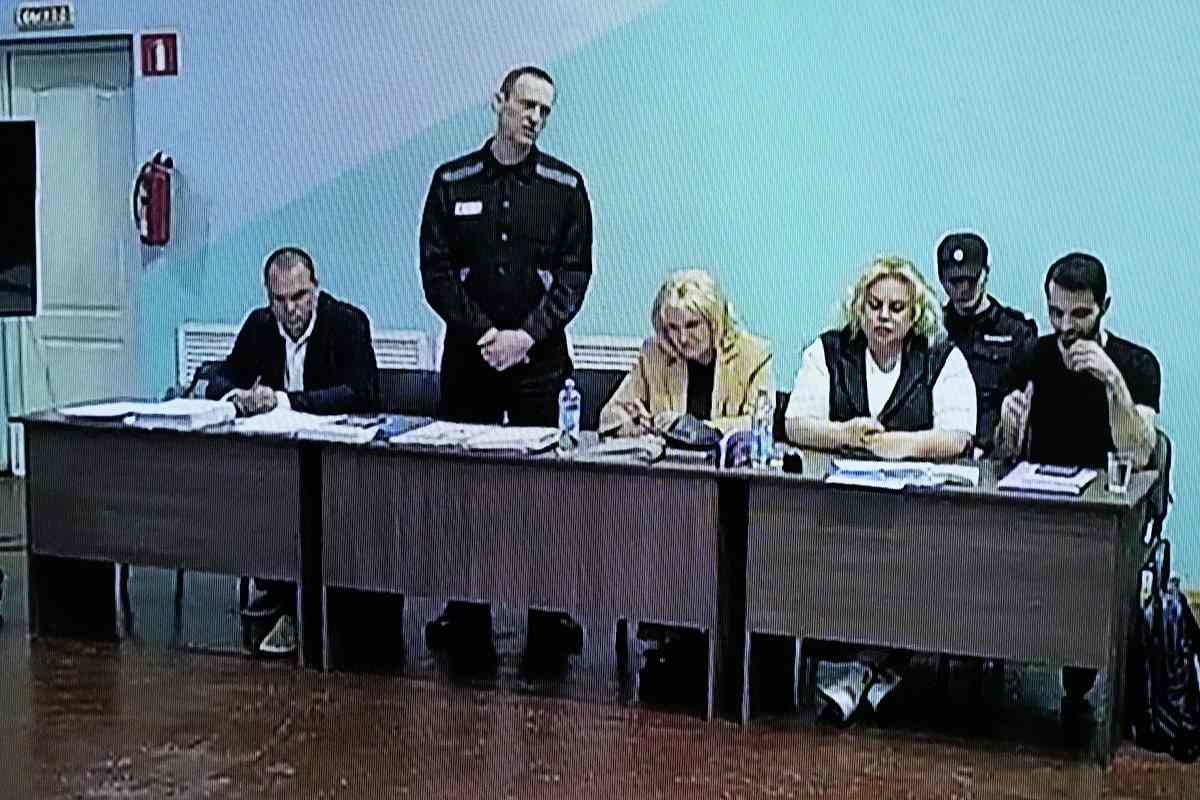Russian Opposition Leader Navalny Urges Anti-Kremlin Campaign as His New Trial Begins

A view of a TV Screen showing Russian opposition leader Alexei Navalny, 2nd left, between his lawyers in a courtroom, via video link provided by the Russian Federal Penitentiary Service, during a preliminary hearing, in Melekhovo, Vladimir region, about 260 kilometers (163 miles) northeast of Moscow, Russia, on Monday, June 19, 2023.
11:04 JST, June 20, 2023
MELEKHOVO, Russia (AP) — Imprisoned Russian opposition leader Alexei Navalny urged his supporters Monday to begin a broad campaign against Moscow’s actions in Ukraine as he went on trial on new charges of extremism that could keep him behind bars for decades.
The trial began inside a maximum security penal colony in Melekhovo, 250 kilometers (150 miles) east of Moscow, where Navalny, 47, is serving a nine-year sentence for fraud and contempt of court — charges he says are politically motivated. Soon after it started, the judge closed the trial despite Navalny’s demand to keep it open.
In a statement posted on social media by his allies, Navalny declared that the decision to close the trial was a sign of fear by President Vladimir Putin, and he announced the start of a campaign against Moscow’s decision to send troops to Ukraine.
Navalny said the effort must reach out to millions to explain the disastrous impact of the fighting and “combat Putin’s lies and the Kremlin’s hypocrisy.” He argued that despite a relentless crackdown on dissent, such a campaign could be efficiently conducted on messaging apps outside the authorities’ control.
“No one but us could enter this fight for our citizens’ hearts and minds, so we need to do it and win,” Navalny said.
Navalny, who exposed official corruption and organized major anti-Kremlin protests, was arrested in January 2021 upon returning to Moscow after recuperating in Germany from nerve agent poisoning that he blamed on the Kremlin.
Wearing his prison garb, Navalny looked gaunt at the session but spoke emphatically about the weakness of the state’s case and gestured energetically.
Navalny has said the new extremism charges, which he rejected as “absurd,” could keep him in prison for another 30 years. He said an investigator told him that he would also face a separate military trial on terrorism charges that potentially carry a life sentence.
The Moscow City Court, which opened the hearing at Penal Colony No. 6, didn’t allow reporters in the courtroom and they watched the proceedings via video feed from a separate building. Navalny’s parents also were denied access to the court and followed the hearing remotely.
Navalny and his lawyers urged the judge to hold an open trial, arguing that authorities are eager to suppress details of the proceedings to cover up the weakness of the case.
“The investigators, the prosecutors and the authorities in general don’t want the public to know about the trial,” Navalny said.
Prosecutor Nadezhda Tikhonova asked the judge to conduct the trial behind closed doors, citing security concerns. The judge agreed and reporters were asked to leave the premises.
Asked about the decision to close the trial, Navalny’s father, Anatoly, told reporters it showed “the utter lack of shame, conscience and dignity.”
Russia’s state news agencies and other media reported on the trial, but the most- watched government-controlled TV stations didn’t cover it.
The new charges relate to the activities of Navalny’s anti-corruption foundation and statements by his top associates. His allies said the charges retroactively criminalize all the activities of Navalny’s foundation since its creation in 2011.
One of Navalny’s associates, Daniel Kholodny, was relocated from a different prison to face trial alongside him.
Navalny has spent months in a tiny, one-person cell, also called a “punishment cell,” for purported disciplinary violations such as an alleged failure to properly button his prison clothes, properly introduce himself to a guard or to wash his face at a specified time.
Navalny’s associates and supporters have accused prison authorities of failing to provide him with proper medical assistance and voiced concern about his health.
As Navalny’s trial began, the Prosecutor General’s office declared the Bulgaria-based Agora human rights group to be an “undesirable” organization. It said the group poses a “threat to the constitutional order and national security” by alleging human rights violations and offering legal assistance to members of the opposition movement.
Russian authorities have banned dozens of domestic and foreign nongovernmental organizations on similar grounds.
In Berlin, the German government criticized the trial of Navalny and reiterated its call for his immediate release.
“In case of of the opposition politician Alexei Navalny, the Russian authorities keep looking for new excuses to extend his imprisonment,” government spokesman Wolfgang Buechner told reporters.
“The German government continues to demand of the Russian authorities that they release Navalny without delay,” he added. “Navalny’s imprisonment is based on a politically motivated verdict, as the European Court of Human Rights concluded back in 2017.”
Asked whether Germany could provide any assistance to Navalny or observe the trial, Foreign Ministry spokesman Christian Wagner said German officials were doing what they could “on the few channels that we have,” but acknowledged it was “very difficult at the moment” given the current state of relations with Russia.
Top Articles in News Services
-

Survey Shows False Election Info Perceived as True
-

Hong Kong Ex-Publisher Jimmy Lai’s Sentence Raises International Outcry as China Defends It
-

Japan’s Nikkei Stock Average Falls as US-Iran Tensions Unsettle Investors (UPDATE 1)
-

Japan’s Nikkei Stock Average Touches 58,000 as Yen, Jgbs Rally on Election Fallout (UPDATE 1)
-

Japan’s Nikkei Stock Average Rises on Tech Rally and Takaichi’s Spending Hopes (UPDATE 1)
JN ACCESS RANKING
-

Producer Behind Pop Group XG Arrested for Cocaine Possession
-

Japan PM Takaichi’s Cabinet Resigns en Masse
-

Man Infected with Measles Reportedly Dined at Restaurant in Tokyo Station
-

Israeli Ambassador to Japan Speaks about Japan’s Role in the Reconstruction of Gaza
-

Videos Plagiarized, Reposted with False Subtitles Claiming ‘Ryukyu Belongs to China’; Anti-China False Information Also Posted in Japan



























